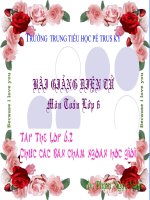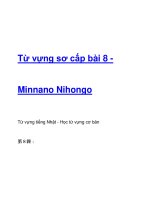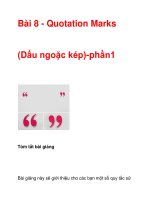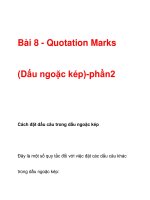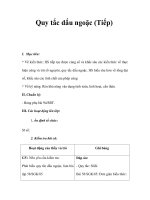Bài 8 - Quotation Marks (Dấu ngoặc kép)-phần2 pps
Bạn đang xem bản rút gọn của tài liệu. Xem và tải ngay bản đầy đủ của tài liệu tại đây (103.78 KB, 16 trang )
Bài 8 - Quotation Marks
(Dấu ngoặc kép)-phần2
Cách đặt dấu câu trong dấu ngoặc kép
Đây là một số quy tắc đối với việc đặt các dấu câu khác
trong dấu ngoặc kép:
• Dấu hỏi chấm, dấu chấm than và dấu gạch ngang sẽ
được đặt bên trong dấu ngoặc kép nếu chúng là một phần
của câu trích dẫn. Nếu chúng không phải hãy các bạn hãy
đặt bên ngoài dấu ngoặc kép.
Ví
dụ
The doctor asked, "Can you feel any pain
in this area?"
Have you read Nathaniel Hawthorne's
"The Birthmark"?
"I wish I'd never heard of—" Karen
stopped abruptly as Nick walked in the
room.
"Stage left," "stage right," "upstage, and
"downstage"—I always confused these
terms.
• Dấu chấm câu vầ dấu phẩy sẽ được đặt bên trong dấu
ngoặc kép.
Ví
dụ
"Let's wait a few minutes," suggested
Doris, "before we leave."
• Dấu hai chấm vầ dấu chấm phẩy sẽ được đặt bên ngoài
dấu ngoặc kép.
Ví
dụ
I can see only one challenge for the
speaker of "The Road Less Traveled":
ambivalence.
The critic called the latest sculpture an
"abomination to sensitive eyes"; the artist
was hurt.
Bài tập thực hành: Các bạn hãy chọn câu sử dụng dấu
câu đúng cách. Đáp án sẽ được đưa ra ở cuối bài.
1. a.
"Have you ever read the story 'The
Open Window' by O. Henry? asked
Martha.
b.
"Have you ever read the story 'The
Open Window' by O. Henry?" asked
Martha.
c.
"Have you ever read the story "The
Open Window" by O. Henry?" asked
Martha.
2. a.
Did you know it was Winston Churchill
who called Russia "a riddle wrapped up
in a mystery inside an enigma"?
b.
Did you know it was "Winston Churchill"
who called Russia "a riddle wrapped up
in a mystery inside an enigma?"
c.
Did you know it was Winston Churchill
who called Russia "a riddle wrapped up
in a mystery inside an enigma?"
3. a.
After reading a review of Toy Story, I
wanted to see the movie.
b.
After reading a review of Toy Story, I
wanted to see the movie.
c.
After reading a review of "Toy Story," I
wanted to see the movie.
4. a.
Leaving five minutes early on Friday
was our "reward."
b.
Leaving five minutes early on Friday
was our "reward".
c.
Leaving five minutes early on Friday
was our 'reward.'
5. a.
"Megabyte," "baud speed," "internal
RAM"—these are all examples of
technical terms.
b.
"Megabyte," "baud speed," "internal
RAM—" these are all examples of
technical terms.
c.
"Megabyte", "baud speed", "internal
RAM"—these are all examples of
technical terms.
6. a.
If you read my article Budget Play in this
morning's Register, you'll understand
why I'm so cynical about Washington
politicians.
b.
If you read my article ''Budget Play" in
this morning's "Register", you'll
understand why I'm so cynical about
Washington politicians.
c.
If you read my article "Budget Play" in
this morning's Register, you'll
understand why I'm so cynical about
Washington politicians.
7. a.
"The story 'What Does Anyone Really
Understand?' certainly gave me
something to think about," remarked
Uncle Art.
b.
'The story "What Does Anyone Really
Understand?" certainly gave me
something to think about,' remarked
Uncle Art.
c.
"The story "What Does Anyone Really
Understand?" certainly gave me
something to think about," remarked
Uncle Art.
8. a.
"Do you name all your cats Howard,"
asked my friend Ted.
b.
"Do you name all your cats Howard"?
asked my friend Ted.
c.
"Do you name all your cats Howard?"
asked my friend Ted.
9. a.
The officer asked us whether we had
seen the accident.
b.
The officer asked us whether we had
seen the accident?
c.
The officer asked us, "Whether we had
seen the accident."
10.
a.
"You would be better off not to offer any
excuses," the personnel director
advised, "I'm afraid that will only make
matters worse."
b.
"You would be better off not to offer any
excuses." the personnel director
advised. "I'm afraid that will only make
matters worse."
c.
"You would be better off not to offer any
excuses," the personnel director
advised. "I'm afraid that will only make
matters worse."
Bài tập củng cố
Các bạn hãy nhìn bất kỳ ví dụ nào về phần dấu ngoặc kép
mà bạn tình cờ đọc được sau đó hãy kiểm tra lại xem
chúng được dùng đúng hay không.
Đáp án
1. b
2. a
3. b
4. a
5. a
6. c
7. a
8. c
9. a
10.
c

